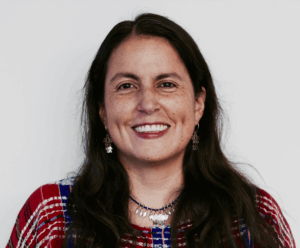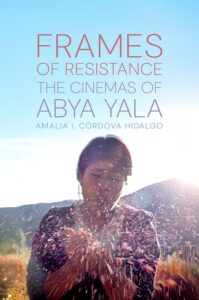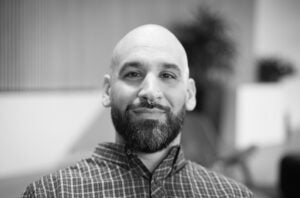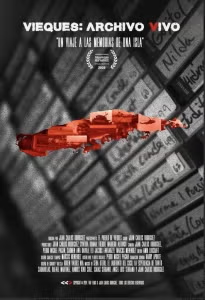Cecilia Aldarondo

Cecilia Aldarondo is a director-producer from the Puerto Rican diaspora who works at the intersection of poetics and politics. Her feature documentaries MEMORIES OF A PENITENT HEART (2016) and LANDFALL (2020) premiered at the Tribeca Film Festival and were co-produced by the PBS series POV. Her third feature YOU WERE MY FIRST BOYFRIEND had its World Premiere at the 2023 South by Southwest Film Festival and is now streaming on HBO. Among Aldarondo’s fellowships and honors are the 2024 Borderlands Visionary Fellowship, the Guggenheim, a three-time MacDowell Colony Fellowship, the IDA Emerging Filmmaker Award, the New America Fellowship, and Women at Sundance. Her newest co-directed film DEAR MS: A REVOLUTION IN PRINT premiered at the 2025 Tribeca Film Festival and is currently streaming on HBO Max. Cecilia teaches at Williams College and is in development on her debut fiction feature.
Artist Talk: Dispatches from the In-Between
(Thursday, December 4, Diboll Gallery, The Commons, 11:00 a.m.–12:30 p.m.)
In this talk, Cecilia Aldarondo follows the threads of un-belonging and diasporic border crossings endemic to her filmmaking practice.
Film Screening: You Were My First Boyfriend
(Thursday, December 4, The Broad Theater, 5:30 p.m., limited to conference presenters)

In this high school reunion movie turned inside out, filmmaker Cecilia Aldarondo embarks on a fantastical quest to reconcile her tortured teen years. She ‘goes back’ in more ways than one, tracking down old foes and friends alike, and re-staging her most primal humiliations while casting herself as a teenager. In a cathartic, time-bending process of letting go, Cecilia is forced to confront the flawed memories she’s held onto for years. Oscillating between present and past, hallucination and reality, You were my First Boyfriend is a hybrid documentary that explores the power of adolescent fantasy, the subtle violence of cultural assimilation, and the funhouse mirror of time’s passage.
Amalia Córdova

Amalia Córdova is a Supervisory Museum Curator at the Smithsonian Institution’s Center for Folklife and Cultural Heritage, where she co-directs the Mother Tongue Film Festival. She was a Latin American program specialist for the Film + Video Center of the Smithsonian Institution’s National Museum of the American Indian, served as Assistant Director of New York University’s Center for Latin American and Caribbean Studies, and taught at New York University’s Gallatin School of Individualized Study. She obtained a Ph.D. in Cinema Studies and an M.A. in Performance Studies, both from New York University. She is from Santiago, Chile/Wallmapu.
Keynote Lecture. Frames of Resistance: The Cinemas of Abya Yala
(Friday, December 5, Lindy Boggs Energy Center 104, 11:00 a.m.–12:30 p.m.)
In Frames of Resistance: The Cinemas of Abya Yala (Oxford University Press, 2025), Amalia I. Córdova Hidalgo examines how Indigenous filmmakers make their cultural vitality visible on screen. She explores the development of collectives, analyzes select works, and uncovers the links between these filmmakers and global cinema. Córdova foregrounds first-person accounts of this movement through new translations of excerpts from films, as well as speeches, interviews, and pronouncements by filmmakers at live events. The result is a book that builds upon Indigenous principles of organization and reciprocal ways of being, offering proposals for teaching practices, circulating these films, and ensuring long-term access to this important body of work.

Bryce Henson

Bryce Henson is an associate professor in the Department of Communication & Journalism and an associate faculty in the Africana Studies Program at Texas A&M University. His books include the award-winning Emergent Quilombos: Black Life and Hip-Hop in Brazil as well as the edited volume, Spaces of New Colonialism: Reading Schools, Museums, and Cities in the Tumult of Globalization. Previously, he was a Fulbright Distinguished Chair in Racial Studies at the Universidade Federal da Bahia. Currently, he serves on the advisory board for the Association for the Study of the Worldwide African Diaspora (ASWAD) and is an associate editor for Transforming Anthropology.
Keynote Lecture. Emergent Quilombos: Black Life and Hip-Hop in Brazil
(Saturday, December 6, Stone Auditorium, 210 Woldenberg Art Center, 11:00 a.m.–12:30 p.m.)
Known as Black Rome, Salvador da Bahia is a predominantly Black city where the local art, food, and music are strongly associated with African roots. Yet, many Black Brazilian residents are socially, politically, and economically marginalized. Based on ethnographic research, this talk illuminates how Black Bahian hip-hop artists and their circles contest structures of anti-Black racism by creating safe havens of rest and refuge as well as alternative social, cultural, and political systems for Black people. That is, they recreate quilombos in contemporary Brazil. This talk ends by advocating for the importance of Black studies to understanding race and racialization, media and popular culture, and freedom dreams amongst African Diasporic communities in Latin America.
Juan Carlos Rodríguez

Juan Carlos Rodríguez (Ph.D., Program in Literature, Duke University, 2007) is Associate Professor of Spanish at Georgia Tech, co-director of the Atlanta Global Studies Center, and co-editor of the collections of essays New Documentaries in Latin America (Palgrave, 2014) and Digital Humanities in Latin America (University Press of Florida, 2020). He is also co-editing a book series, Reframing Media, Technology, and Culture in Latin/o America, for the University of Florida Press. His research focuses on Latin American documentaries from perspectives informed by sustainability, critical theory, urban and environmental studies, and digital humanities. As an educator and scholar, Rodríguez has a strong record of community engagement. He is the founding director of Georgia Tech’s Global Media Festival: Sustainability Across Languages and Cultures. His public digital humanities project Vieques Struggle: A Digital Video Archive, is a collection of video interviews that tells the story of demilitarization in the island of Vieques in Puerto Rico. Using materials from the Vieques Struggle project, he just completed his first long feature documentary, Vieques: A Living Archive, which covers the history of Vieques before and after the departure of the US Navy from the island in 2003.
Documentary Screening: Vieques: A Living Archive
(Friday December 5, Screening at the Village Theater, Lake Residence Hall, 5:15 p.m. – 7:30 p.m)
In a gripping and unpredictable 20-year quest, Juan Carlos Rodríguez showcases the poignant story of Vieques. Through intimate recollections, community voices, and archival footage, the film exposes the profound hardships endured by Viequenses before and after the US Navy’s departure in 2003. This documentary examines how a demilitarized community confronts social, economic, and environmental challenges. The film focuses on the environmental and health costs of the US military presence while looking at the dilemmas of post-Navy Vieques.

Conference Presenters
Agnès Mondragón Celis (University of Rochester), “Crime Talk, Extraterritorial ‘Justice,’ and the Politics of Mediation in the Drug War”
Ahryeong Hong (Tulane University), “Cinematic Archaeology of U.S. Military Bases in Puerto Rico and South Korea”
Alexander Fattal (University of California, San Diego), Limbo
Alicia Echavarria (Northwestern University), “Remembering Palos: Weaving Collective Memory through Fabulation”
Amalia Córdova (Smithsonian Institution’s Center for Folklife and Cultural Heritage), Keynote Lecture. Frames of Resistance: The Cinemas of Abya Yala
Ana Llurba (Rutgers University), “Desenterrar el futuro: temporalidades salvajes e historia profunda en A Idade da Pedra de Ana Vaz”
Ana María Granados Romero (Graduate Center, CUNY), “Pirotecnia: performance, simulación y collage en la producción de imágenes en Colombia”
Analays Álvarez Hernández (Université de Montréal), Diffracting the North: Contemporary Latinx Canadian Experiences and Practices in Film, New Media, and Visual Arts, “Latinx- Artists and Curators in Montréal, Paris, and Madrid: Challenging the Logic of Reinforced Subalternity”
Anastasia Valecce (Spelman College), “Aesthetics in Motion: Disobedient Media and the Affective Politics of Afro-Queer Feminist Art in Puerto Rico”
Angel Carrasco (University of Southern California), “Tío Yim: Indigenous Documentary Film as Restorative Justice”
Anisell Esparza (Pontificia Universidad Católica de Chile), Activar el archivo: recrear La agonía de Arauco, Gabriela Bussenius, 1917. Impartido por el Laboratorio Implosivo de cine
Antonio Gómez (Tulane University), “(Re)claimed Archives: El silencio es un cuerpo que cae (Agustina Comedi, Argentina, 2017)”
Bárbara Galindo (University of California Riverside), “Sobre la humanidad originaria y el genocidio de ‘urihi a’ o ‘tierra-bosque’ en A Última Floresta (2021)”
Brenda Borges (Tulane University), “Lifting for the Lord: The Intersection of Faith and Gym Culture Online”
Bryce Henson (Texas A&M University), Keynote Lecture: Emergent Quilombos: Black Life and Hip-Hop in Brazil
Carlos Gerardo González Orellana (Tulane University), “Desenterrar la memoria. A propósito del duelo y el archivo en el espacio rural en Nuestras madres de César Díaz”
Carolina Caballero (Tulane University)
Carolina Dávila (New York University), “Estéticas del exceso: hacia una lectura posthumana y ecopolítica de tres obras audiovisuales de Mika Rottenberg”
Carolina Sánchez (Tulane University), “Mapeos y postextractivismo en la poética intermedial de la artista venezolana Erika Ordosgoitti”
Catherine Benamou (University of California-Irvine)
Cecilia Aldarondo (Williams College), You Were My First Boyfriend, Artist Talk: Dispatches from the In-Between
Cecily Raynor (McGill University), “Transmedia Narratives Against Extractivism: Stories of the Environment from the Americas”
Christine Hernández (Tulane University, chair and moderator), “Bringing back the Soaps: Digitizing radionovelas from the Louis Boeri and Minín Bujones Boeri Collection of Cuban American Radionovelas”
David Tenorio (University of Pittsburgh), Queer Relajo: Feeling the Nightscapes of Mexicanidad
Dunja Fehimović (Newcastle University), “Entre la heterogeneidad y la resistencia: Un acercamiento ampliado al cine comunitario en Puerto Rico”
Emily A. Maguire (Northwestern University), “Slugs at the Door, Tentacles in the Bedroom: Environmental Crisis in José Luis Aparicio’s Tundra”
Emmanuel Ramos-Barajas (Northwestern University), “Past Perfect? Canon Formation and the Golden Age of Mexican Cinema”
Ezra Remer (Tulane University), Powerful Little Island
Farides Lugo Zuleta (University of California Riverside), “Responsabilidad epistémica: Locura colonial, degradación de la futuridad y circulación del conocimiento ancestral en El abrazo de la serpiente (2015)”
Freya Schiwy (University of California Riverside, chair and moderator), “The Sound of Silence. Thinking Through Ecocide and Assemblage in Dusk Chorus (2017)”
Gabrielle Corona (Princeton University), “State Surveillance and Historical Erasure in Los Tigres Del Norte at Folsom Prison (2019)”
Gayle Williams (Florida International University), Latin American and Caribbean Screenplays in Print: An annotated Bibliography
Gerardo Pignatiello (Binghamton University-SUNY), “Historia y futurización en el cine latinoamericano del siglo XX”
Gilberto Balsini (University of Wisconsin, Milwaukee), “21st Century Islanders’ Survival Tactics: Building (Gendered) Communities in Los Domirriqueños (2015) and Perfume de Gardenias (2021)”
Hannah Palmer (Tulane University), Indigenous Representation and Futurities in Latin American Cinema
Hortensia Calvo (Tulane University), “Introduction: Moving Media out of the Archive”
Ignacio Sarmiento (California State University, Northridge), ‘“20 de diciembre: duelo nacional’: la invasión estadounidense de Panamá en el cine reciente”, Violencia y memoria en el cine centroamericano contemporáneo (Parte 2)
Irene Depetris Chauvin (Universidad de Buenos Aires / CONICET), “La tierra mediada. Afectos y materialidades en prácticas artísticas vinculadas a la minería en Brasil”
Isabel Messina (Universidad Autónoma Metropolitana), Nuestras Historias
Isabella Vergara (University of Michigan, Ann Arbor), “María José Arjona’s Corporeal Media and Temporal Disobedience”
Isdanny Morales Sosa (Tulane University), “Sugar Intimacies in Contemporary Cuba: Remembering the Mill on Facebook Groups”
Ivonne Cotorruelo Pérez (University of Connecticut), “Reencuadrar el archivo: contraarchivo y justicia curatorial en el documental cubano contemporáneo”
Jack Riordan (University of Texas at Austin), AVAnnotate Open Source Application for Audiovisual Digital Exhibits and Editions
Jacqueline Amezcua (Tulane University), “Race and National Identity in Photographs of Brazilian Ballroom”
Jacqueline Avila (University of Texas at Austin), “Los sonidos de medianoche: Music, Soundscape, and Familial Drama in Apple TV+’s Familia de medianoche (2023)”
Jacqueline Loss (University of Connecticut, chair and moderator), “Filming Contradiction: Translating Lo Fino Across Image and Word”
Joaquín Serpe (Emerson College), “Pop Populism: Public TV, Hipness, and intellectuals of Argentina´s Cultural Wars”
Jorge Marcone (Rutgers University), “Amazonian Ontologies and Ecocides from the Past: Ancient Builders of the Amazon (2025), and Amazônia, Arqueologia da Floresta (2022, 2024)”
José Luis Suárez Morales (Texas Christian University), “No-Futuros: El infante, migración y abolición de la política”
José Miguel Palacios (California State University Long Beach), Transnational Cinema Solidarity: Chilean Exile Film & Video after 1973 , “Raúl Ruíz at the House of Culture in Le Havre: Archives of Labor and Modes of Production”
Jossianna Arroyo (The University of Texas at Austin), “Caribes 2.0: Race, New Media and the Afterlives of Disaster”, Caribbean Media Afterlives: Race, Gender and Performance
Juan Andres Bello (University of Western Ontario), “The telenovela archives”
Juan Antonio García Borrero (Investigador Independiente), Enciclopedia Digital del Audiovisual Cubano
Juan Carlos Rodríguez (The Georgia Institute of Technology), “Vieques, Archives, Bodies: The Quest for Environmental Justice Across Media Practices”, Vieques Screening, Circulating Media in the Caribbean
Juan Llamas-Rodriguez (University of Pennsylvania), “Poder Prieto, Racial Activism, and Streaming Platforms in Mexico”, Y Tu Mamá También: A Queer Film Classic
Juan Pablo Gómez (Tulane University), “La gran catástrofe del 7 de junio de 1934 from the Alfredo A. Massi Collection”
Julia M. Medina (University of San Diego), “Patrolling the Meat Industry: Documentary Film and Indigenous Agency in Nicaragua”
Julia Nava (University of California, Irvine), “Transborder Piracies: An Exploration of Pirate Internet Television Protocol Services and Latinx Communities”
Justo Planas (Le Moyne College), “Framing Paradise: Mexican Film and the Tourist Imaginary of the Caribbean”
Katerina González Seligmann (University of Connecticut), “Cultural Infrastructure, Censorship, and the Bounds of Revolutionary Anti-Racism: Mixed Methods Notes on 1966-1975 in Cuba”
Katerina Ramos-Jordán (Brown University), “Rituales de erosión: Los ensayos anticoloniales del cine experimental de Beatriz Santiago Muñoz, Sofía Gallisá Muriente y Natalia Lasalle Morillo”
Laura-Zoë Humphreys (Tulane University), “Analog Video as Domestic Labor in Cuba”
Luisela Alvaray (DePaul University), “Latin American Stories for the World: Producing for Streamers”
Luz Mely Reyes (Efecto Cocuyo), “Te Tienes Que Ir”
Margaret Frohlich (Dickinson College), “Intermediality and Archive in Rolando Díaz’s Adiós Cuba”
María C. Cumana (Tulane University), “The Curatorial Work of Memory Through Film: La línea del ombligo (2023) by Carla Valdés León as an Example of Filmic Curatorship”
María del Carmen Caña Jiménez (Virginia Tech), “El Salvador en tránsito: desmitificaciones de la contemporaneidad en Hoy de Ricardo B’atz”
María Elena Cepeda (Williams College), “Listening Entre Líneas: Transnational Colombiana Crip Memory and Diasporic Reverb”
Maria Isabel Messina (Universidad Autónoma Metropolitana), Nuestras Historias,“Affective Archive in Motion: Audiovisual Testimony, Trans Subjectivity, and the Intimacy of Listening”
Marisa Hicks-Alcaraz (University of California, Santa Cruz), “Recovering Mujerista Media Histories: Building the Latina Media Recovery Project”
Mary Leonard (University of Cincinnati),“Movements in Puerto Rican Film and Media: Wandering, Breaking Out, Returning”
Maximiliano de la Puente (CONICET), Cuando vi al gran árbol caer
Maybel Mesa Morales (Lycoming College), “Maternar el archivo: intermedialidad afectiva y resistencias íntimas en el audiovisual cubano realizado por mujeres”
Mike Levine (Christopher Newport University), “Technological Disobedience in Offline Cuba: Packaging and Sharing Music Through El Paquete Semanal”
Moira Fradinger (Yale University), “Archival (in)accessiblity: El juicio (Ulises de la Orden, Argentina, 2023)”
Mónica-Ramón Ríos (Pratt Institute), Activar el archivo: recrear La agonía de Arauco, Gabriela Bussenius, 1917. Impartido por el Laboratorio Implosivo de cine, Female Agency in Films Made by Latin American Women
Mónica Baró (University of Miami), “¿Del deshielo al exilio: qué sucedió con el periodismo independiente cubano posterior a la Primavera Negra?”
Nahuel Ribke (The Open University of Israel), “Black Orpheus’s Multicolor Brazil, Cinemascope Technology and the Economics of On-Location Shooting”
Nathan Henne (Loyola University), Forging a Mexican People: Collective Subjectivities in Postrevolutionary Print Culture, 1917-1968
Nathan Rossi (Northwestern University), “Aftershocks: Queer Narratives in the Growth of Transnational Central American Cinema”
Néstor Arce Aburto (Divergentes), “Reinstalarse como periodistas en el exilio: Un camino lleno de desafíos… y éxitos”
Nils Longueira Borrego (California State University, Fullerton), “(Re)staging confession: El caso Padilla (Pavel Giroud, Cuba, 2022)”
Oriele Benavides (Princeton University), “Archival Affects: Los archivos del Cardenal, a political telenovela”
Pablo Zavala (Loyola University), Forging a Mexican People: Collective Subjectivities in Postrevolutionary Print Culture, 1917-1968
Pedro Noel Doreste Rodríguez (Michigan State University), “Romance in Absentia: Reception of a Puerto Rican Film Found and Lost”
Patricia Arroyo Calderón (University of California Los Angeles), “¡No fue el fuego, fue el estado!: Filmmaking, Memory-Making, and the Struggle for Justice in Rita, by Jayro Bustamante (Guatemala, 2024)”
Reynaldo Lastre (College of the Holy Cross), chair and moderator), “Nuclear Toxicity as Political Critique in Blue Heart by Miguel Coyula”
Ruth Goldberg (SUNY Empire State College), “Venecia and Me: A Post-Viral Inquiry on Autotheory, Cuban Cinema and Narrative Healing”
Sarah Brokenborough (Tulae University), “Curating an Afro-America Between Brazil and the United States”
Susannah Rodríguez Drissi (University of California Los Angeles), “Gentlemen Prefer Silence: Autofiction, Archive, and the Visual Performance of Intimacy”
Susanne Hackett (Tulane University), “Romancing the Machete: the Yoruba Ogun Archetype in the Cuban Imaginary”
Ted A. Henken (Baruch College, CUNY), “No es fácil, pero sí es posible: Practicando periodismo crítico desde el exilio”
Teresa Clifton (Tulane University), “Teaching with Radionovelas”
Thomas Matusiak (University of Miami), “The Politics of Enchantment in the Animation of León & Cociña”
Vania Barraza (University of Memphis, co-editor), Female Agency in Films Made by Latin American Women,“Revisions of Indigenous Repressions in Recent Historical Chilean Cinema”
Vinodh Venkatesh (Virginia Tech), “Circular Fatalisms in Jayro Bustamante’s Temblores”
Watufani Poe (Tulane Univerisity), Media, Visual Culture, and Socio-Political Life in Brazil
Wilfredo José Burgos Matos (Lehman College, CUNY), “Maldita vida: Amargue and the Communal Ecologies of a Dominican Affect”
Willamys Melo (University of Santa Catarina), “Communication and Racialized Power: Media as a Mechanism of White Supremacy”
Yeidy M. Rivero (University of Michigan-Ann Arbor), “Considering Place: Mini: El Angel del Barrio, New York City, and Genre Shifts”
Zaira Zarza (Université de Montréal), Diffracting the North: Contemporary Latinx Canadian Experiences and Practices in Film, New Media, and Visual Arts
Zorimar Rivera Montes (Tulane University), “Disappropriation, friendship, and undiscipline in the work of Macha Colón”, Vieques Screening, “Feminist Refugee Narratives in Cuban Cinema: Migration Documentaries by Women Diasporic Filmmakers”
